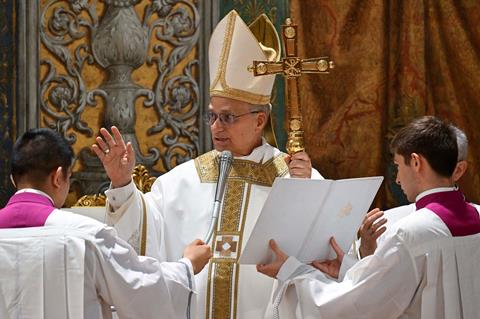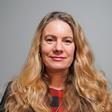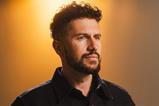Cardinal Robert Prevost has been elected as the 267th leader of the Catholic Church. Pope Leo XIV was an unexpected choice, so here’s what we know about the Augustinian priest who was formerly a missionary in Peru

The election of Cardinal Robert Prevost was a choice that very few Catholic commentators were expecting. Many thought the next Pope may come from global South – so the first North American-born Pope was quite a surprise.
Who is Pope Leo?
Robert Prevost, 69, was born in 1955 and raised in a working-class family with Spanish and Italian roots in Chicago, Illinois. His family say he wanted to be a priest ever since he was a child, and he joined the Catholic Church in 1985, aged 27, after studying mathematics and then theology at university. Later, he earned a PhD in canon law while in Rome.
Prevost worked as a missionary in Peru for many years, gaining dual nationality and becoming a bishop there in 2015. He was made Archbishop just two years ago in 2023. Peter Williams of Catholic Voices said that it was “encouraging” that the new Pope “knows what it is to work on the mission field, sharing the message of Jesus in different contexts and cultures.”
He’s also an Augustinian, part of the religious order founded by St Augustine of Hippo, and ran an Augustinian seminary in Trujillo, Peru. Most recently, Prevost served as the head of the church’s Dicastery for Bishops, overseeing the appointment of new bishops.
A compromise candidate?
With 70 per cent of current cardinals appointed by the late Pope Francis, many were expecting the new Pope to carry on where Francis left off. Others wanted a change, someone steadier, less outspoken or more conservative.
Some have suggested that Pope Leo was a compromise candidate, as a centrist reformer who is progressive on social issues such as championing marginalised groups, migrants and the poor, while remaining conservative on issues of Church doctrine, such as abortion.
He has previously opposed the ordination of women, but in 2024, he told the Catholic News Service that women’s presence “contributes significantly to the process of discernment in looking for who we hope are the best candidates to serve the Church in episcopal ministry”.
His views on issues of sexuality and gender are not yet clear. He showed support for Pope Francis’ declaration to permit blessings for same-sex couples and others in “irregular situations” but added that bishops must interpret such directives in accordance with local contexts and cultures. Some have suggested he may be less liberal than his predecessor.
What’s in a name?
Prevost has chosen to be known as Pope Leo XIV. A pope’s choice of name is often based on what the previous pope of that same name was known for. In this case, Pope Leo XIII, who served from 1878 to 1903, was known as an intellectual and theological reformer who championed social issues, writing a series of encyclicals about the social doctrine of the Church.
Pope Leo is a centrist reformer, progressive on social issues and conservative on issues of Church doctrine
It is likely that the current Pope Leo was inspired by this focus on social justice and the teaching of the Church - and what this has to say to issues such as the organisation of society, the rights of workers and immigration, for example.
US Bishop Robert Barron told CBS News that Leo XIII “represents a very nuanced, intelligent engagement with modernity — not caving into it, not saying yes completely, but not saying no — using the resources of our own traditions to engage modernity creatively. That makes him a bridge figure.”
Return to tradition
Many traditionalists welcomed Pope Leo’s first appearance on the balcony of St Peter’s Basilica wearing the traditional red shoulder cape and heavily embroidered stole that Pope Francis famously refused to wear in the interests of simplicity and humility.
For those who value the symbolism contained in the traditional Papal regalia, the fact that Leo seems happy to wear it will be pleasing - and perhaps points towards other returns to tradition that Francis eschewed, including residing in the papal apartments.
Speaking out
Although generally considered less outpoken that his predecessor, as a cardinal, Robert Prevost regularly shared his political views – and criticism of politicians - on social media.
He has spoken out against US President Donald Trump’s stance on immigration and has also been critical of Vice President JD Vance, a Catholic convert who defended the administration’s immigration policies using the Order of Loves, saying Christian teachings priorised love for your family, then neighbours, county and finally beyond.
In response, an account attributed to the now-pope shared a National Catholic Reporter article with the headline: “JD Vance is wrong: Jesus doesn’t ask us to rank our love for others.”
JD Vance is wrong: Jesus doesn't ask us to rank our love for others https://t.co/hDKPKuMXmu via @NCRonline
— Robert Prevost (@drprevost) February 3, 2025
Controversies
Not everyone is happy with the choice of pope, however. The Survivors Network of those Abused by Priests (SNAP) have accused Prevost of “staying silent” in the face of abuse allegations, after a priest removed from ministry in Chicago was allowed to move into an Augustinian Friary without nearby school leaders being informed. They also claim that he failed to open a formal investigation into alleged sexual abuse carried out by two priests in the Diocese of Chiclayo, Peru, which he led from 2014 to 2023.
SNAP said they informed the 135 cardinals responsible for selecting the new pope of Prevost’s alleged inaction. “Jesus wants us to stop these things, not make a heathy garden for sexual abuse to grow,” said Lopez de Casas, a victim of clergy abuse and vice president of SNAP.
In 2023, Prevost told journalists that, while much “good work has already been done” to deal with historic abuse in the Church, he believed there was still much to learn. With Pope Francis also coming under fire for not getting to grips with abuse scandals quicker, it is hoped that Pope Leo will now use his experience to ensure that such abuses are not allowed to reoccur.
In his first words as Pope, Leo XIV spoke fondly of his predecessor Francis. “We still hear in our ears the weak but always courageous voice of Pope Francis who blessed us,” he said. “United and hand in hand with God, let us advance together,” he told cheering crowd






































No comments yet